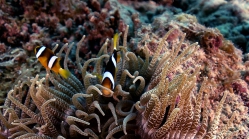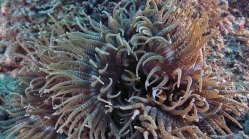
| Intro | | About | | Wiki | | Search traits | | Data explorer | | Literature | | Definitions | | Sources | | Webservices | | Statistics | | Feedback | | Editors | | Log in |
Traits taxon detailsRadianthus crispa (Hemprich & Ehrenberg in Ehrenberg, 1834)
290089 (urn:lsid:marinespecies.org:taxname:290089)
accepted
Species
marine,
(of ) Ehrenberg, C. G. (1834). Beiträge zur physiologischen Kenntniss der Corallenthiere im allgemeinen, und besonders des rothen Meeres, nebst einem Versuche zur physiologischen Systematik derselben. <em>Abhandlungen der Königlichen Akademie der Wissenschaften, Berlin.</em> 1: 225-380., available online at https://www.biodiversitylibrary.org/page/29725862
page(s): 260 [details]
Rodríguez, E.; Fautin, D; Daly, M. (2025). World List of Actiniaria. Radianthus crispa (Hemprich & Ehrenberg in Ehrenberg, 1834). Accessed through: Marine Species Traits editorial board (2025) Marine Species Traits at: https://www.marinespecies.org/traits/aphia.php?p=taxdetails&id=290089 on 2025-05-06
Marine Species Traits editorial board (2025). Marine Species Traits. Radianthus crispa (Hemprich & Ehrenberg in Ehrenberg, 1834). Accessed at: https://www.marinespecies.org/traits/aphia.php?p=taxdetails&id=290089 on 2025-05-06
Date action by
original description
(of ) Ehrenberg, C. G. (1834). Beiträge zur physiologischen Kenntniss der Corallenthiere im allgemeinen, und besonders des rothen Meeres, nebst einem Versuche zur physiologischen Systematik derselben. <em>Abhandlungen der Königlichen Akademie der Wissenschaften, Berlin.</em> 1: 225-380., available online at https://www.biodiversitylibrary.org/page/29725862
page(s): 260 [details] context source (Hexacorallia) Fautin, Daphne G. (2013). Hexacorallians of the World. (look up in IMIS) [details] basis of record den Hartog, J. C. & van der Land, J. (2000-2007). As a contribution to UNESCO-IOC Register of Marine Organisms. (look up in IMIS) [details] additional source Fautin, Daphne G. (2013). Hexacorallians of the World. (look up in IMIS) [details] additional source Humes, A.G. (1982). A review of Copepoda associated with sea anemones and anemone-like forms (Cnidaria, Anthozoa). Transactions of the American Philosophical Society, Philadelphia 72(2):1-120, figs. 1-46, tabs. 1-5. page(s): 41 [details] Available for editors additional source Dunn, D. F. (1981). The clownfish sea anemones: Stichodactylidae (Coelenterata: Actiniaria) and other sea anemones symbiotic with pomacentrid fishes. Transactions of the American Philosophical Society, 71, 1, 1-115 page(s): 3, 26, 40, 44, 47-57, 62, 65, 71, 103, 105, 107-108 [details] additional source Fautin, D. G. (1988). Sea anemones (Actiniaria and Corallimorpharia) of Madang Province. Science in New Guinea, 14(1): 22-29 page(s): 23 Tab. 1, 25-26 [details] additional source Richardson, D. L. (1999). Correlates of environmental variables with patterns in the distribution and abundance of two anemonefishes (Pomacentridae: Amphiprion) on an eastern Australian sub-tropical reef system. Environmental Biology of Fishes, 55, 255-263 page(s): 256 [details] additional source Richardson, D. L.; Harriott, V. J.; Harrison, P. L. (1997). Distribution and abundance of giant sea anemones (Actiniaria) in subtropical eastern Australian waters. Marine and Freshwater Research, 48, 59-66 page(s): 60-65 [details] additional source Fautin, D. G. (1985). Competition by anemone fishes for host actinians. Proceedings of the Fifth International Coral Reef Congress, 5, 373-377 page(s): 374-377 [details] additional source Fautin, D. G. (1986). Why do anemonefishes inhabit only some host actinians?. Environmental Biology of Fishes, 15(3): 171-180 page(s): 172-173, 176, 179 [details] additional source Arvedlund, M.; McCormick, M. I.; Fautin, D. G.; Bildsøe, M. (1999). Host recognition and possible imprinting in the anemonefish Amphiprion melanopus. Marine Ecology Progress Series, 188, 207-218 page(s): 208, 211-213, 215 [details] additional source Arvedlund, M.; Bundgaard, I.; Nielsen, L. E. (2000). Host imprinting in anemonefishes (Pisces: Pomacentridae): does it dictate spawning site preferences?. Environmental Biology of Fishes, 58, 203-213 page(s): 206-208 [details] additional source den Hartog, J. C. (1997). The sea anemone fauna of Indonesian coral reefs. Periplus Editions. Republic of Singapore., chapter Box 8.2, volume 7, pp. 351-370 page(s): 356 [details] additional source Paulay, G.; Puglisi, M. P.; Starmer, J. A. (2003). The non-scleractinian Anthozoa (Cnidaria) of the Mariana Islands. Micronesica, 35-36, 138-155 page(s): 148 [details] additional source Mitchell, J. S. (2003). Mobility of Stichodactyla gigantea sea anemones and implications for resident false clown anemonefish, Amphiprion ocellaris. Environmental Biology of Fishes, 66, 85-90 page(s): 87 [details] additional source Astalhov, D. A. (2002). Species composition of anemonefishes (Perciformes, Pomacentridae) and their host sea anemones (Cnidaria, Actiniaria) in the Khanhhoa Province (South Vietnam). Journal of Ichthyology, 42(1): 37-50 page(s): 37-38, 41-46, 48 [details] additional source Brolund, T. M.; Tychsen, A.; Nielsen, L. E.; Arvedlund, M. (2004). An assemblage of the host anemone Heteractis magnifica in the northern Red Sea, and distribution of the resident anemonefish. Journal of the Marine Biological Association of the United Kingdom, 84, 671-674 page(s): 674 [details] additional source Hattori, A. (2006). Vertical and horizontal distribution patterns of the giant sea anemone Heteractis crispa with symbiotic anemonefish on a fringing coral reef. Journal of Ethology, 24(1): 51-57 page(s): 51, 52, 53, 54, 55, 56 [details] additional source Hermansen, T. D.; Arvedlund, M.; Fiedler, G. C. (2005). Calcium antagonists inhibit the discharge of cnidae in response to electrical stimulation in the giant tropical sea anemone Heteractis crispa Ehrenberger (Anthozoa). Marine and Freshwater Behaviour and Physiology, 38, 4, 269-274 page(s): 269, 270, 271, 273 [details] additional source Scott, A.; Harrison, P. L. (2005). Syncronous spawning of host sea anemones. Coral Reefs, 24, 208 page(s): 208 [details] additional source Fautin, D. G. (1991). The anemonefish symbiosis: what is known and what is not. Symbiosis, 10, 23-46 page(s): 26, 37 [details] additional source Scott, A.; Harrison, P. L. (2007). Broadcast spawning of two species of sea anemone, Entacmaea quadricolor and Heteractis crispa, that host anemonefish. Invertebrate Reproduction and Development, 50(3): 163-171 page(s): 163-169 [details] additional source Chadwick, N. E.; Arvedlund, M. (2005). Abundance of giant sea anemones and patterns of association with anemonefish in the northern Red Sea. Journal of the Marine Biological Association of the United Kingdom, 85(5): 1287-1292 page(s): 1287, 1288, 1289, 1290, 1291 [details] additional source Scott, A.; Harrison, P. L. (2008). Larval settlement and juvenile development of sea anemones that provide habitat for anemonefish. Marine Biology, 154(5): 833-839 page(s): 833-838 [details] additional source Kokshoorn, B.; Goud, J.; Gittenberger, E. (2007). Epitoniid parasites (Gastropoda, Caenogastropoda, Epitoniidae) and their host sea anemones (Cnidaria, Actiniaria, Ceriantharia) in the Spermonde archipelago, Sulawesi, Indonesia. Basteria, 71, 33-56 page(s): 37, 41, 44, 47, 48, 49, 51 [details] additional source Arvedlund, M.; Iwao, K.; Brolund, T. M.; Takemura, A. (2006). Juvenile Thalassoma amblycephalum Bleeker (Labridae, Teleostei) dwelling among the tentacles of sea anemones: a cleanerfish with an unusual talent?. Journal of Experimental Marine Biology and Ecology, 329, 161-173 page(s): 162, 166, 167 [details] additional source Scott, A.; Harrison, P. L. (2007). Embryonic and larval development of the host sea anemones Entacmaea quadricolor and Heteractis crispa. Biological Bulletin, 213, 110-121 page(s): 110-119 [details] additional source Fautin, D. G.; Crowther, A. L.; Wallace, C. C. (2008). Sea anemones (Cnidaria: Anthozoa: Actiniaria) of Moreton Bay. Memoirs of the Queensland Museum, 54(1): 35-64 page(s): 36, 39, 40 [details] additional source Hattori, A. (2000). Social and mating systems of the protandrous anemonefish Amphiprion perideraion under the influence of a larger congener. Austral Ecology, 25(2): 187-192 page(s): 187, 188 [details] additional source Fautin, D. G.; Tan, S. H.; Tan, R. (2009). Sea anemones (Cnidaria: Actiniaria) of Singapore: abundant and well-known shallow-water species. Raffles Bulletin of Zoology, 22, 121-143 page(s): 121, 123, 134-135, 136, 139, 140 [details] additional source den Hartog, J. C. (1994). Sea anemones of the Seychelles. J. van der Land (eds.). National Museum of Natural History. Leiden, chapter 6.2, volume 2, pp. 75-79 page(s): 77, 78 [details] additional source Chen, C.; Soong, K.; Chen, C. A. (2008). The smallest oocytes among broadcast-spawning actiniarians and a unique lunar reproductive cycle in a unisexual population of the sea anemone, Aiptasia pulchella (Anthozoa: Actiniaria). Zoological Studies, 47(1): 37-45 page(s): 38 [details] additional source Shuman, C. S.; Hodgson, G.; Ambrose, R. F. (2005). Population impacts of collecting sea anemones and anemonefish for the marine aquarium trade in the Philippines. Coral Reefs, 24, 564-573 page(s): 567, 568, 570 [details] additional source Allen, G. R.; Drew, J.; Kaufman, L. (2008). Amphiprion barberi, a new species of anemonefish (Pomacentridae) from Fiji, Tonga, and Samoa. Aqua -- International Journal of Ichthyology, 14(3): 105-114 page(s): 114 [details] additional source Bos, A. R. (2011). Clownfishes Amphiprion clarkii and A. sandaracinos (Pomacentridae) coexist in the sea anemone Stichodactyla mertensii. Coral Reefs, 30, 369 page(s): 369 [details] additional source Dunn, D. F. (1985). Sea anemones that harbor symbiotic pomacentrid fishes in the western Pacific. National Geographic Society Research Reports, 18, 279-283 page(s): 280 [details] additional source den Hartog, J. C. (1997). Notes on the genus Amphiprion Bloch & Schneider, 1801 (Teleostei: Pomacentridae) and its host sea anemones in the Seychelles. Zoologische Mededelingen, Leiden, 71(17), 181-188 page(s): 182-184 [details] additional source Hirose, Y. (1985). Habitat, distribution and abundance of coral reef sea-anemones (Actiniidae and Stichodactylidae) in Sesoko Island, Okinawa, with notes on expansion and contraction behavior. Galaxea, 4(2), 113-127 page(s): 114, 116-125 [details] additional source Titus, B. M.; Bennett-Smith, M. F.; Chiodo, T.; Rodríguez, E. (2024). The clownfish-hosting sea anemones (Anthozoa: Actiniaria): updated nomenclature, biogeography, and practical field guide. <em>Zootaxa.</em> 5506(1): 1-34., available online at https://doi.org/10.11646/zootaxa.5506.1.1 [details] additional source Choudhury, S.; Sivaperuman, C. (2022). Status and Distribution of Sea Anemone in Great Nicobar Biosphere Reserve. <em>Faunal Ecology and Conservation of the Great Nicobar Biosphere Reserve.</em> 485-504., available online at https://doi.org/10.1007/978-981-19-5158-9_24 [details] additional source Griffiths, C. L.; Laird, M. C. (2016). Additions to the South African sea anemone (Cnidaria, Actiniaria) fauna, with expanded distributional ranges for known species. <em>African Invertebrates.</em> 57(1): 15-37., available online at https://doi.org/10.3897/afrinvertebr.57.8459 [details] ecology source Bennett-Smith, M. F.; Majoris, J. E.; Titus, B. M.; Berumen, M. L. (2021). Clownfish hosting anemones (Anthozoa, Actiniaria) of the Red Sea: new associations and distributions, historical misidentifications, and morphological variability. <em>Marine Biodiversity Records.</em> 14(1)., available online at https://doi.org/10.1186/s41200-021-00216-6 [details]  Present Present  Inaccurate Inaccurate  Introduced: alien Introduced: alien  Containing type locality Containing type locality
To Biodiversity Heritage Library (3 publications)
To Biological Information System for Marine Life (BISMaL) To Digital Atlas Of Marine Species & Locations, DAMSL (Leathery Sea Anemone) To Digital Atlas Of Marine Species & Locations, DAMSL (Leathery Sea Anemone) To European Nucleotide Archive, ENA (Radianthus crispa) To GenBank (185 nucleotides; 188 proteins) To Global Biotic Interactions (GloBI) To USNM Invertebrate Zoology Cnidaria Collection (28 records) To ITIS |




